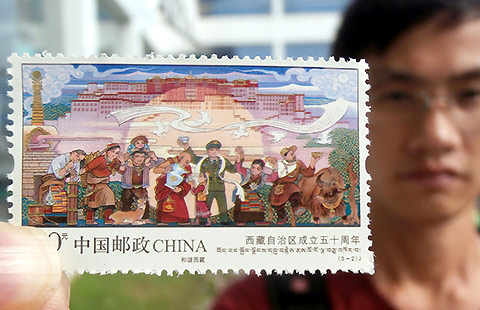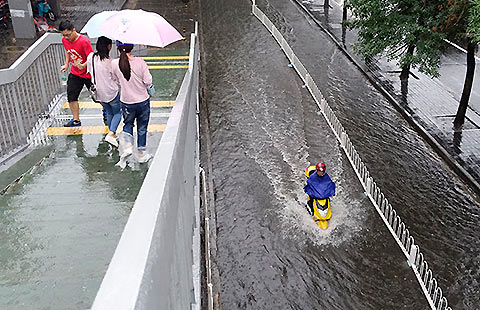Reefs increase 10% after rescue by 'blue knights'
Updated: 2015-08-26 07:45
By Huang Yiming in Haikou and Lin Shujuanin Beijing(China Daily)
|
||||||||
Diving team conquers harsh conditions to restore coral
Dazhou Island is the largest offshore island in Hainan province, with its clear waters attracting a wide variety of tropical fish.
It lies 5.5 kilometers and about an hour by fishing boat from the nearest harbor of Xinqun.
For the past two years, Qian Jun, 25, has spent at least six months a year on the 4.36-sq-km island. But he is not there to fish. As a graduate student majoring in marine biology at Hainan University, Qian, along with two classmates, is there to restore coral reefs.
The three call themselves "the blue knights", and a typical working day sees them diving into the sea to restore reefs and record the growth of transplanted coral.
Sometimes they also move crown-of-thorns starfish and clear abandoned fishing nets and other marine debris harming the reefs. When night falls, they borrow fishing lamps to write their reports.
The oceanic province of Hainan boasts a rich diversity of coral reefs stretching over hundreds of square kilometers.
But as marine conditions for coral reefs worsen globally, they have seen a significant reduction along the coastline of Hainan since the 1970s, according to the Hainan Marine Development Planning and Design Research Institute.
The world has effectively lost 19 percent of its original coral reefs area, and about 15 percent of reefs are seriously threatened with losses within the next 10 to 20 years, according to The Global Reefs Status Report 2008 released by the Global Coral Reef Monitoring Network.
"The coral reefs distribution area in China has shrunk by about 80 percent since the 1950s, and the reefs' ecosystems are showing signs of severe degradation," Qian said.
The Dazhou Island reef restoration project was launched by the State Oceanic Administration in 2013. Qian, who was a senior marine biology student then, and his team led by Li Hongwu, won the bid for restoration work.
The first and biggest challenge the team faced was to come up with a coral reef base that could withstand frequent typhoons and drifting sand.
They tried for six months before making a breakthrough. They designed a reef base in the shape of a pyramid with one support pillar and four support hooks to anchor it to the seabed. The top of the base was made from concrete and featured many circular structures to enable the transplanted reefs to adhere to the man-made base.
"We failed many times but never lost faith," Qian said.
He and his colleagues have installed 67 man-made transplanted reef bases that withstood challenges from super typhoons Rammasun and Kalmaegi last year and from drifting sand. The transplanted coral is growing well, Qian said.
Thanks to their efforts, reef coverage areas around the island have increased by 10 percent, covering 60,000 square meters of water since last year. It has been the only successful domestic project to transplant coral reefs in waters with drifting sand.
But the success has come through hard work.
Life on Dazhou Island is not easy. Mice and mosquitoes abound, and without air conditioning it is so hot that it can be difficult to sleep during the summer. In winter, the water is cold but the team has to stay in it for six hours a day so colds are a frequent occurrence.
Outside communication is limited, since the island has patchy access to electricity and almost no access to mobile phone signals or the Internet.
"My mother worried about me a lot when she learned about the hard living conditions on the island," Qian said.
Qian, who grew up in the inland city of Lanzhou, Gansu province, and longed for the sea when he was young, said: "I have gained professional knowledge and know that ... if you want to do well at a specific task, you have to solve all kinds of problems."
The work has won Qian's team many awards, and their innovation has also been awarded a patent in China.
Liu Xiaoli contributed to this story.
- Three killed, 8 missing after fishing boat capsizing in S.Korea
- Migration crisis tears at EU's cohesion and tarnishes its image
- Britain signals move towards air strikes in Syria
- Snowden accepts Norwegian prize via video link
- Tokyo ditches Olympic logo amid new plagiarism allegation
- Japan criticized for protest over UN chief's visit to Beijing

 50th anniversary of Tibet autonomous region
50th anniversary of Tibet autonomous region
 Red carpet looks at the 72nd Venice Film Festival
Red carpet looks at the 72nd Venice Film Festival
 China beats Russia in 4 sets at volleyball World Cup
China beats Russia in 4 sets at volleyball World Cup
 8th Int'l Military Music Festival 'Spasskaya Tower' begins
8th Int'l Military Music Festival 'Spasskaya Tower' begins
 Downpour floods streets in Beijing
Downpour floods streets in Beijing
 Veterans attend V-Day anniversary gala show
Veterans attend V-Day anniversary gala show
 Military helicopters write number 70 high in the sky
Military helicopters write number 70 high in the sky
 Salute to veterans
Salute to veterans
Most Viewed
Editor's Picks

|

|

|

|

|

|
Today's Top News
Austria, Germany open borders to migrants
Central government steps up economic support for Tibet
China economy enters 'new normal' eyeing 7% growth rate: G20
Troop cuts signal path of peaceful development
Sino-Russian investment fund eyes more deals
Predicting Internet's future without a crystal ball
Silk Road Fund to expand ties with lenders
Intl community echoes Xi's speech at V-Day commemoration
US Weekly

|

|







